Ylva Johansson (Commissioner for Home Affairs, European Commission)
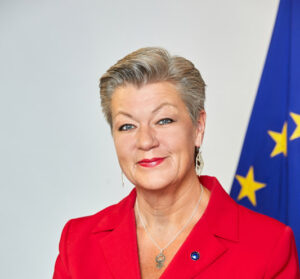
Ylva Johansson was appointed European Commissioner for Home Affairs in December 2019. From Sweden, she was Minister for Employment in the Swedish Government from 2014 to 2019, Minister for Welfare and Elderly Healthcare from 2004 to 2006 and Minister for Schools from 1994 to 1998. Ms. Johansson was educated at Lund University and the Stockholm Institute of Education. She is married with three children.
Krum Garkov (Executive Director, eu-LISA)
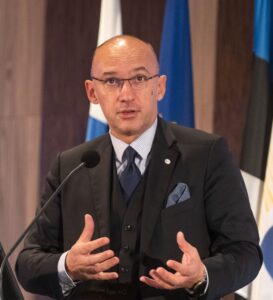
Mr Garkov has more than 20 years of cross-cultural experiences spanning the public and private sectors.
He took up the Executive Director post at eu-LISA in November 2012 and has lead the Agency with the vision to promote information and communication technologies as a key success factor for integrated border management and law enforcement at the EU level. He sees eu-LISA’s mission in helping Members States in their efforts for safer Europe and ensuring the continuous and stable service delivery to them in the ever evolving digital environment.
Before eu-LISA, he was the Operations Director for Experian Group Ltd., a leading global information provider serving the finance industry. Prior to that, Mr Garkov was Program Manager at Hewlett-Packard. He has also served the National Revenue Agency, as well as the Centre for Mass Privatization in Bulgaria. Mr Garkov holds an M. Sc. in Computer Technologies (Varna), an MBA in Information Systems (Stevens Institute of Technology, New Jersey) and has received executive education from London School of Business & Finance with an MBA in Management Consulting.
Dr Günter Krings (Parliamentary State Secretary to the Federal Minister of the Interior, Building and Community, Germany)

From 1989 to 1995, Dr Krings studied law and history at the University of Cologne and at Temple University, Philadelphia, where, as a Fulbright scholar, he received a Master of Laws in US and international law. In 2002, he received his doctoral degree (with a dissertation on the basis and limitations of constitutional claims to protection) from the University of Cologne where he also worked as a research assistant at the Institute for Public Law (1997 – 2002). In addition, he worked as a lecturer at the Cologne School of Journalism (1997 – 2002) and as a lawyer (1998 – 2013).
Since 2002, Dr Krings has been a Member of the German Bundestag for the Christian Democratic Union (CDU). Among various assignments he was legal officer and deputy chairman of the CDU/CSU parliamentary group. In December 2013, he was appointed Parliamentary State Secretary to the Federal Minister of the Interior and in March 2018 he was appointed Parliamentary State Secretary to the Federal Minister of the Interior, Building and Community.
Since 2009, he has headed the Federal Working Group of Christian Democratic Lawyers (BACDJ) and is by virtue of this function a member of the Federal Executive of the CDU. He is also chairman of the Mönchengladbach county association of the CDU. Since 2014, he has been chairman of the CDU Niederrhein and since 2017 chairman of the CDU North Rhine-Westphalia at the German Bundestag.
Monique Pariat (Director-General for Migration and Home Affairs, European Commission)

Since January 2020, Monique Pariat is the Director-General for Migration and Home Affairs (DG HOME) in the European Commission. She leads the adoption, implementation, and monitoring of the EU’s legislation and policy on migration and asylum as well as on internal security.
Between 2015-2020, Monique Pariat was the Director-General responsible for European Civil Protection and Humanitarian Aid Operations (DG ECHO). In this role, she oversaw the development and implementation of the EU’s humanitarian aid, which each year helps over a hundred million people in need across the globe. She also oversaw the Union’s civil protection mechanism which aims at protecting people, the environment and property in the aftermath of disasters both inside and outside the EU.
Previously, Monique Pariat held numerous senior management posts in the European Commission, in the departments dealing with agriculture and rural development, fisheries and maritime affairs, as well as justice, freedom and security.
Monique Pariat joined the European Commission in 1987. She graduated from the Institute of Political Studies of Strasbourg and obtained a master’s degree from the College of Europe in Bruges.
Olivier Onidi (Deputy Director-General, Directorate-General for Migration and Home Affairs, European Commission)
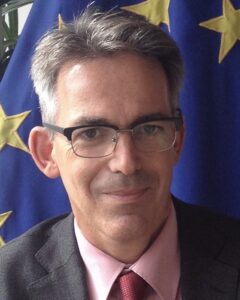
Since May 2016, Olivier Onidi is Deputy Director-General of the Directorate-General for Migration and Home Affairs (DG HOME) at the European Commission with particular responsibility over security. In this capacity, he oversees the activities in the fields of terrorism and violent extremism, organized crime, cybersecurity, information systems and innovation. He also headed the Secretariat of the European Commission’s Task Force for the Security Union. Since March 2020, he is also EU Anti-trafficking Coordinator.
His last assignment was Deputy Director-General of DG HOME with the specific task to coordinate the Commission-wide work related to the Central Mediterranean Route in the context of the refugees’ crisis.
Previously, he was Director for the European Mobility Network within the Directorate-General for Mobility and Transport (DG MOVE), responsible for the development of the Trans-European Transport Network infrastructure, the implementation of the Connecting Europe Facility funding instrument and for the creation of a Single European Rail Area. Prior to this, he was Director for Innovative and Sustainable Mobility, in charge of transport security, clean and urban transport, intelligent transport systems and road safety.
Olivier Onidi also worked as Deputy Head of Cabinet of the Energy Commissioner, Mr Günther H. Oettinger, as Head of Unit for air transport services, aviation safety and environment and was Head of the Satellite Navigation System programme – GALILEO.
His first posts in the Commission were Assistant to Directors-General in the areas of Energy and Transport and External Relations. He then moved to the Secretariat General and afterwards became Member of Cabinet of the Commissioner for Research and Development, Innovation, Education and Training.
Before joining the Commission, Olivier Onidi worked as Adviser to the Executive Committee of Belgacom and as Public Policy Manager at American Express International.
Olivier Onidi holds Master degrees in International Economics, European Studies and Business Administration.
Jürgen Ebner (Deputy Executive Director of Europol, Governance Directorate)

Jürgen Ebner was born in Germany in 1966. He joined the police in 1988, where he occupied various operational positions at the Federal Criminal Police and reached a post at the Cabinet of the President.
Between 2001 and 2006, Mr Ebner worked at Europol, starting as Seconded National Expert followed by three years as Head of Unit Directorate Support and reaching the post of Acting Assistant Director Corporate Governance.
Between 2006 and 2019, he served at the BKA, starting with five years as Head of Section, planning, strategy and future oriented analysis. In 2011 he became Deputy Head of the Personal Protection Division, responsible for commanding and implementing state visits to Germany, and as Deputy Commander for major events.
In 2016, he reached the rank of Head of Division Central Information Management, leading a large and diverse division (650 law enforcement officers, public servants and scientists) with a focus on Information Management, Business related development of national and international Police ITsystems, biometric systems in order to improve identification and identity management. He furthermore was responsible for the development of national and international search systems such as Schengen Information System, Interpol Search Systems and the establishment of the Passenger Information Unit. His responsibilities included developments such as the EU-regulations on SIS, interoperability and Eurodac.
In 1988 Mr Ebner studied at the University of Applied Administration Sciences – Departmental Branch of the Criminal Police, where he obtained Bachelor’s degree in Public Administration.
In 1995, he obtained a Master’s degree in Business Administration/Political Economics from the University of Bonn, followed in 1999 by a Master’s degree in Public Administration – Police Management, Training for the Higher Police Service at the German Police University. He also attended advanced training at the Federal Academy for Security Policy and in Pearls in Policing. Mr Ebner was appointed by the Council of the EU to his current post as Deputy Executive Director of Europol with specific responsibility for Governance matters, including as Europol’s Security Coordinator. He took up his functions in November 2019.
Dr. Kai Schollendorf (Head of Division, Directorate-General for Public Security, Federal Ministry of the Interior, Building and Community, Germany)

Dr. Kai Schollendorf is Head of Division in the Directorate-General for Public Security of the German Federal Ministry of the Interior, Building and Community. His areas of responsibility cover a wide range of topics in the context of (Police) Information Management on national, European and international level, including: the German Police Information System (INPOL), Data Protection by Security Authorities, oversight over the Information Management and IT-Department of the Federal Criminal Police Office (BKA), implementation of the new SIS-Regulations, establishment of the national PNR-System as well as the implementation of the Interoperability Regulations. Prior to this he held posts in the Public Service Directorate-General and in the Constitutional Law Directorate-General. In 2015/2016 he was Deputy Head of the Ministry’s Refugee Crisis Coordination Staff. He started his career as a lawyer in the German Federal Ministry for the Environment.
Dr. Kai Schollendorf studied law in Göttingen and Belfast. He holds a law degree from the University of Göttingen and a Doctor Juris from the University of Mainz.
Herbert Reul (Minister of the Interior of the State of North Rhine-Westphalia)
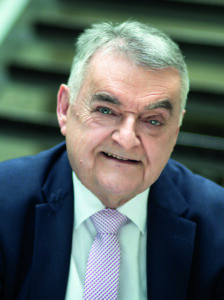
North Rhine-Westphalia with its 18 million inhabitants is the largest state in Germany. It has far-reaching legislative powers, the vast majority of police competence lies at state level of the German Länder.
Since June 2017 Herbert Reul has been Minister of the Interior of North Rhine-Westphalia, being responsible for the state’s internal security, the police, the Office for the Protection of the Constitution, the fire brigades and civil protection. To fulfill these tasks he ended his mandate as Member of the European Parliament, of which he was a member from 2004 to 2017. There he was, among others, chairman of the German members of the EPP parliamentary group and from 2009 to 2012 chairman of the Committee on Industry, Research and Energy.
From 1985 to 2004 Reul was a member of the North Rhine-Westphalian state parliament.
“When things are going wrong, the citizens have to be assured that the state acts determinately”, is his credo as minister.
In 2018, he launched a broad-based initiative to convince his colleagues, the interior ministers of the German states of the need for interoperability of security authorities‘ data systems. This was subsequently unanimously adopted by the German Bundesrat, the second parliamentary chamber in Germany.
Dieter Schürmann (State Director of Criminal Investigation of the State of North Rhine-Westphalia)
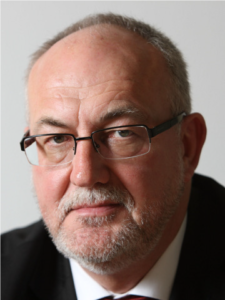
Dieter Schürmann joined the police service of the state of North Rhine-Westphalia in 1976. He gained practical experience at the beginning of his career as an investigator in homicide and in organized crime.
In 1990 he moved to the higher police service.
Until 2005 he held various management and leadership positions in the spectrum of special police units, the fight against organized crime, police evaluation and analysis as well as crime prevention. At the district government of Düsseldorf, he was responsible for the criminal police supervision of the police authorities of the administrative district and finally he was head of department at the State Office of Criminal Investigation NRW.
In 2005, he moved to the Ministry of the Interior of North Rhine-Westphalia as a consultant for crime and police state security matters and as a representative of the State Director of Criminal Investigation.
Since 2010, he has been the State Director of Criminal Investigation, the highest ranking criminal police officer in the State of NRW, and thus advisor to the Minister in all matters of preventive and repressive crime control.
In addition to the specialist criminal police supervision of the State Office of Criminal Investigation and the 47 district police authorities of the State of North Rhine-Westphalia, this includes in particular the design and implementation of the crime strategy of the State of North Rhine-Westphalia within the framework of the security policy programs and decisions of the State Government.
Birgit Sterzenbach (Senior Police Officer, State Police of North Rhine-Westphalia)

Birgit Sterzenbach is a senior police officer with the state police of North Rhine-Westphalia (NRW).
She joined the police service in 1999 and following basic studies and training, she was assigned to the uniformed police service in Cologne where she worked as a patrol officer and with the anti-riot unit until 2006.
Subsequent assignments followed in the district of Oberberg and the State Bureau for Education and Training NRW where she served as a police trainer on various subjects.
In 2010 she passed her diploma at the Public Administration College in Cologne and her master in public administration and police management at the German Police University in 2020. Her master thesis outlined the “Interoperability of the european information systems”, focussing on the added value of the interoperability regulations in the field of combating terrorism and other serious crimes for law enforcement authorities in NRW.
Since October 2020, Birgit Sterzenbach is heading the „Joint Counter Terrorism Center – NRW“ at the State Bureau of Criminal Investigation NRW (Landeskriminalamt).
Rob Rozenburg (Head of Police Cooperation and Information Exchange Unit, DG Migration and Home Affairs, European Commission)
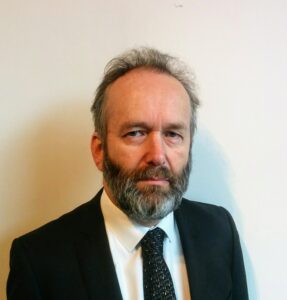
Mr Rozenburg studied Political Science and International Law at the University of Amsterdam. After an initial career in a Dutch NGO and in the private sector he joined the European Commission in 1994, where he worked in various positions in the area of trade, external relations, development and home affairs. Mr. Rozenburg is currently the Head of Unit ‘Police Cooperation and Information Exchange’ in the Commission’s Directorate-General for Migration and Home Affairs.
Adriano Silvestri (Programme Manager in the Asylum and Migration, Technical Assistance and Capacity Building Unit, FRA)

Adriano Silvestri’s areas of expertise with respect to the FRA’s work include international human rights and refugee law as well as the EU acquis relating to asylum, borders and immigration. Before joining the FRA he was at the United Nations High Commissioner for Refugees (UNHCR), where he worked in the field for several years (Armenia, the Russian Federation and Austria) as well as at UNHCR headquarters. He worked on a wide range of activities, both legal as well as operational, relating to asylum, the protection of internally displaced persons and statelessness. He was involved in the development of UNHCR tools and guidelines, for example on the best interests of the child or on assessing protection gaps for internally displaced persons. He also worked for the World Wide Fund for Nature in the Altai-Sayan region. He studied law in Italy and international law in Geneva.
François Laruelle (Head of ETIAS and Interoperability Task Force, Frontex)
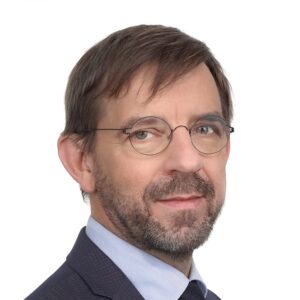
François has an extensive experience in the development and the management of national and international IT systems in the areas of law enforcement and border management.
François has been working for more than 34 years in the field of Law Enforcement and Border Management. He started his career in the Belgian Gendarmerie where he was a Platoon Commander, then became a Deputy District Commander in a district located at the French border. He was building there his operational experience for a period of 6 and a half years, before moving to the area of Information and Communication Technology at the Belgian Gendarmerie. François directly contributed – as a Project Manager – to the implementation of the first generation of the Schengen Information System (SIS) in Belgium and was the Chairman of international technical workgroups for the implementation of the system in 1995 and 1998.
He moved then to the Belgian Common Police Support Services as an Assistant on IT matters to the Director of the International Cooperation Division, working at the same time as an Assistant Director of the SIRENE Office. He was then appointed as a Deputy Director of the Information and Technology Division of the Common Police Support Services, where he became responsible for the management of the International Systems for the police forces in Belgium. During that time, he represented Belgium in the Standing Committee for Information Technology at Interpol.
In April 1999, François joined Europol where he took the position of a Team Leader for user support and training, before becoming the Head of the IT Infrastructure and Operations Unit in 2001. He actively participated in the development and the implementation of the Europol Information System. In 2008, after coming back to the Belgian Federal Police, he was appointed the Director ad interim of the Telematics Division (Information Communication Technology and Radio Systems). Within this period, he was also chairing during 18 months the Working Group for IT matters of the Europol Management Board.
In September 2012, François became the Head of the ICT Unit in Frontex and he was holding that position until August 2019, while at the same time working already on ETIAS Since 1 November 2018, he is the Head of the ETIAS and Interoperability Task Force, responsible for the programme management in Frontex of the projects and activities related to the setting up of the ETIAS Central Unit and the implementation of Interoperability.
François holds a Master’s degree in Criminology from the University of Liège and a Bachelor’s degree in Information Technology from the Technical High School of Bruges. He also followed postgraduate studies and got a Master’s degree in Information System Management at the University of Liverpool.
Jeroen de Graaf (Program Director Borders & Security, Ministry of Justice and Security, The Netherlands)

Jeroen de Graaf started in May 2018 as Program Director Borders & Security within the Ministry of Justice and Security in The Netherlands. The years before he was posted as ambassador in Port of Spain (Trinidad and Tobago) and was acting as a Director for Security and Crisis Management in the Ministry of Foreign Affairs.
Jeroen de Graaf started his career as a lawyer for the Immigration- and Naturalization Service, worked as Head of the Policy Department and as Director for International Cooperation. Jeroen de Graaf has a master degree in International Law and Public management.
Sören Clerton (Deputy Police Commissioner, Swedish Police)
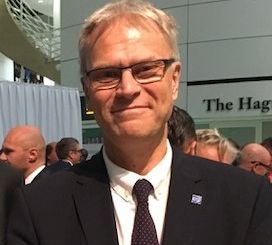
Mr. Clerton has long experience of police work and of international police cooperation. He has held different management posts. He also has had different assignments, for example; head of the SIRENE Bureau, member and chair of the Europol Management Board, head of the Europol National Unit (HENU), member of the Frontex Management Board. He had also been negotiator in the EU, representing the Swedish Government (SIS II and “the Swedish Initiative” concerning information exchange between Law Enforcement Agencies etc.).
Joe B. Lynam (Moderator of the Conference)

Joe Lynam is a respected broadcaster and moderator who was the BBC’s senior Business Correspondent for a decade. He now presents the current affairs show ‘The Newsroom’ on BBC Radio 4 and the World Service.
Joe has won many awards for his original journalism including the 2018 Headline Money Award for his BBC One exposé of how RBS (GRG) treated many of its own business customers. Joe was also the first to broadcast on Radio 4 a phone fraud (Vishing) in almost real time as an elderly lady unwittingly handed over her life savings to fraudsters. For that, he won the Wincott prize for Journalism in 2016.
Joe has travelled the world with the BBC covering the financial crisis (2007-2010), followed by the Eurozone crisis (2010-2013) and more recently the economic and political fallout from the Brexit referendum. He has presented on the Today programme, Newsnight, BBC One Breakfast as well as Five Live and the BBC News Channel. He has lived in Germany, UK, Netherlands, Australia, Belgium and Ireland and speaks five languages.

